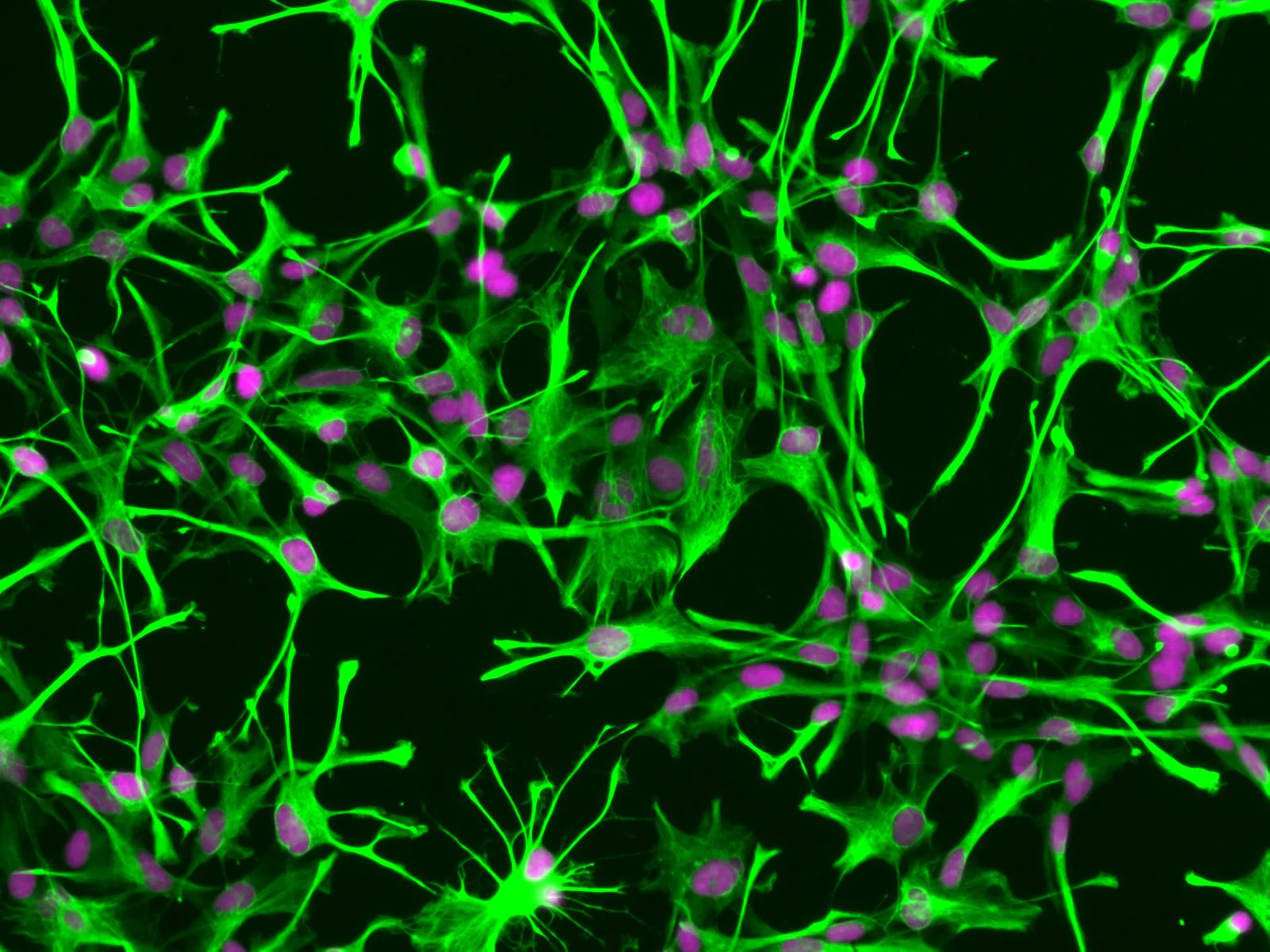Human Astrocytes
Product Code:
SC-1800
SC-1800
Host Type:
Human
Human
Regulatory Status:
RUO
RUO
No additional charges, what you see is what you pay! *
| Code | Size | Price |
|---|
| SC-1800 | 1 x 10^6 cells/vial | £783.00 |
Quantity:
Prices exclude any Taxes / VAT
Stay in control of your spending. These prices have no additional charges, not even shipping!
* Rare exceptions are clearly labelled (only 0.14% of items!).
* Rare exceptions are clearly labelled (only 0.14% of items!).
Multibuy discounts available! Contact us to find what you can save.
This product comes from: United States.
Typical lead time: 10-14 working days.
Contact us for more accurate information.
Typical lead time: 10-14 working days.
Contact us for more accurate information.
- Further Information
- Documents
- References
- Related Products
- Show All
Further Information
Extra Description:
Isolated from human brain (cerebral cortex). HA are cryopreserved at passage one and delivered frozen. Please select the desired cell density below.
Long Description:
Astrocytes are the major cell type in the mammalian brain. They provide a variety of supportive functions to their partner neurons in the central nervous system (CNS), such as neuronal guidance during development, and nutritional and metabolic support throughout life. Astrocytes have also been implicated in various pathological processes. Impairment of normal astrocyte functions during stroke and other insults can critically influence neuron survival. Long-term recovery after brain injury, through neurite outgrowth, synaptic plasticity, or neuron regeneration, is also influenced by astrocyte surface molecule expression and trophic factor release. Numerous studies have demonstrated that astrocytes are among the most functionally diverse group of cells in the CNS. Much of what we have learned about astrocytes is from in vitro studies and astrocyte culture is a useful tool for exploring the diverse properties of this cell type.
HA from ScienCell Research Laboratories are isolated from human brain (cerebral cortex). HA are cryopreserved at passage one and delivered frozen. Each vial contains >1 x 10^6 cells in 1 ml volume. HA are characterized by immunofluorescence with antibody specific to GFAP. HA are negative for HIV-1, HBV, HCV, mycoplasma, bacteria, yeast, and fungi. HA are guaranteed to further expand for 10 population doublings under the conditions provided by ScienCell ResearchLaboratories.
Recommended Medium -
It is recommended to use Astrocyte Medium (AM, Cat. #1801) for culturing HA in vitro.
Documents
References
- https://www.ncbi.nlm.nih.gov/pmc/articles/PMC3890698/
- https://pubmed.ncbi.nlm.nih.gov/24812668/
- https://pubmed.ncbi.nlm.nih.gov/24092664/
- https://www.ncbi.nlm.nih.gov/pmc/articles/PMC3938592/
- https://pubmed.ncbi.nlm.nih.gov/25051234/
- http://journals.plos.org/plosone/article/asset?id=10.1371/journal.pone.0075543.PDF
- https://www.scienceopen.com/document_file/1f6be79c-ee59-4aa0-aba3-9bd8dad8fa5a/PubMedCentral/1f6be79c-ee59-4aa0-aba3-9bd8dad8fa5a.pdf
- https://molecularbrain.biomedcentral.com/articles/10.1186/s13041-015-0138-6
- https://journals.plos.org/plosone/article?id=10.1371/journal.pone.0150360
- https://pubmed.ncbi.nlm.nih.gov/25651941/
- https://www.ncbi.nlm.nih.gov/pmc/articles/PMC2831230/
- http://journals.plos.org/plosone/article/asset?id=10.1371/journal.pone.0145235.PDF
- https://www.ncbi.nlm.nih.gov/pmc/articles/PMC4480752/
- http://www.ncbi.nlm.nih.gov/pmc/articles/PMC4428755/pdf/nihms687563.pdf
- http://www.ncbi.nlm.nih.gov/pmc/articles/PMC4594676/pdf/jcmm0019-2341.pdf
- https://pubmed.ncbi.nlm.nih.gov/26751456/
- https://www.ncbi.nlm.nih.gov/pmc/articles/PMC4627295/
- http://www.la-press.com/redirect_file.php?fileId=7156&filename=5346-GRSB-Epigenetic-Regulation-of-Tissue-Type-Plasminogen-Activator-in-Human-Br.pdf&fileType=pdf
- https://journals.plos.org/plosone/article?id=10.1371/journal.pone.0143112
- http://www.ncbi.nlm.nih.gov/pmc/articles/PMC4673998/pdf/cam40004-1705.pdf
- http://www.ncbi.nlm.nih.gov/pmc/articles/PMC4780270/pdf/medscimonit-22-710.pdf
- http://f1000researchdata.s3.amazonaws.com/manuscripts/8385/e8b1f021-7282-484d-b88e-4850c6d7b33c_7142_-_david_male_v2.pdf
- https://pubmed.ncbi.nlm.nih.gov/26720731/
- http://www.ncbi.nlm.nih.gov/pmc/articles/PMC4679401/
- https://www.ncbi.nlm.nih.gov/pmc/articles/PMC4098062/
- and more!



